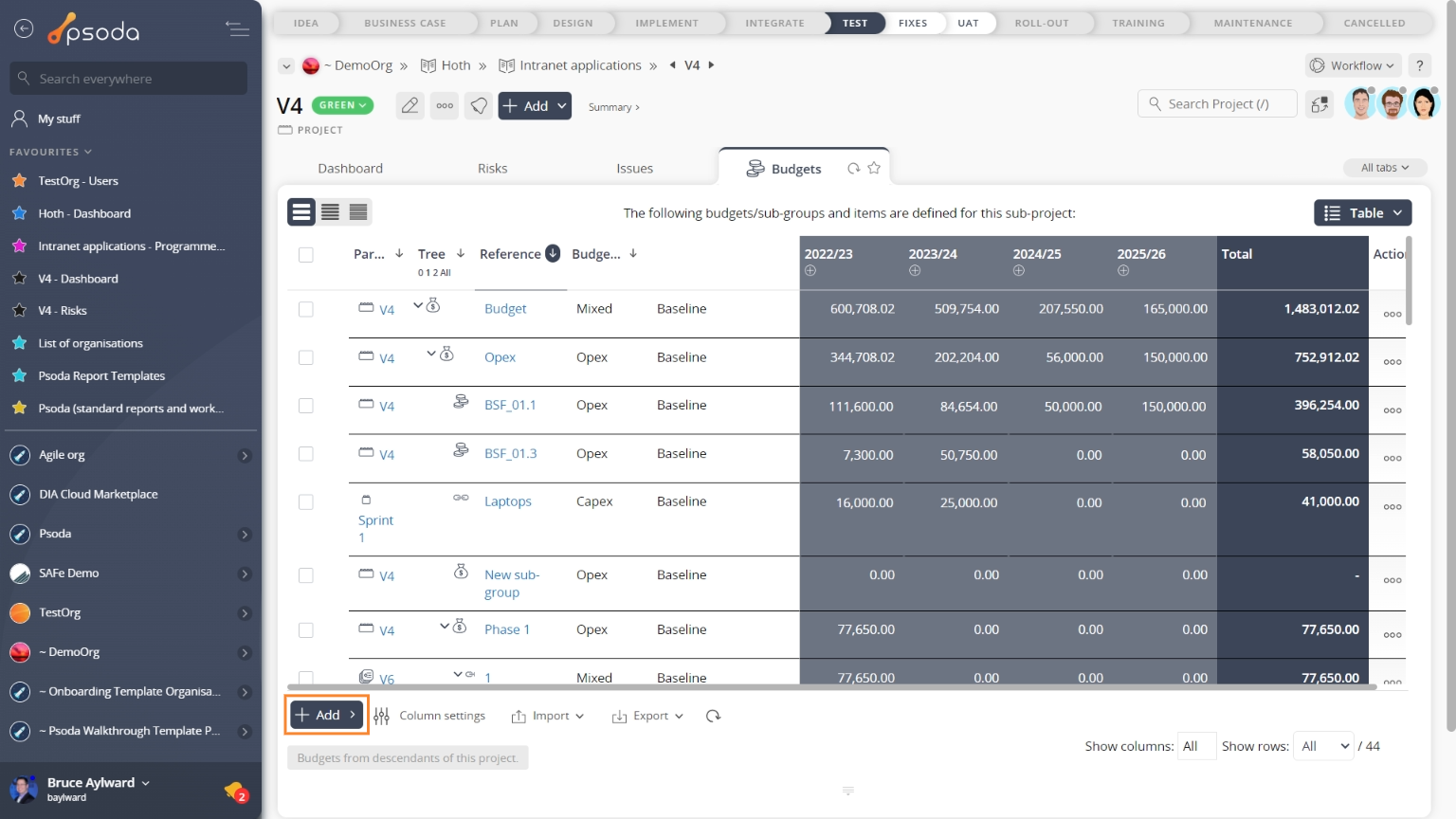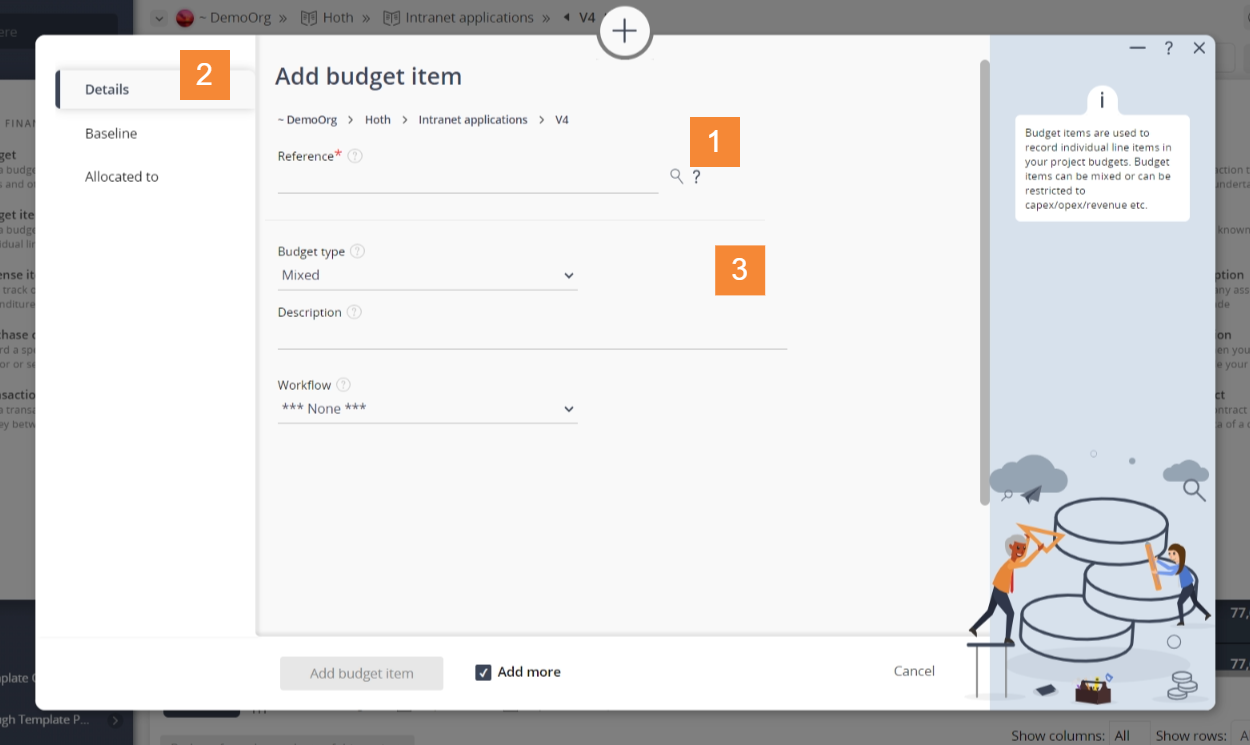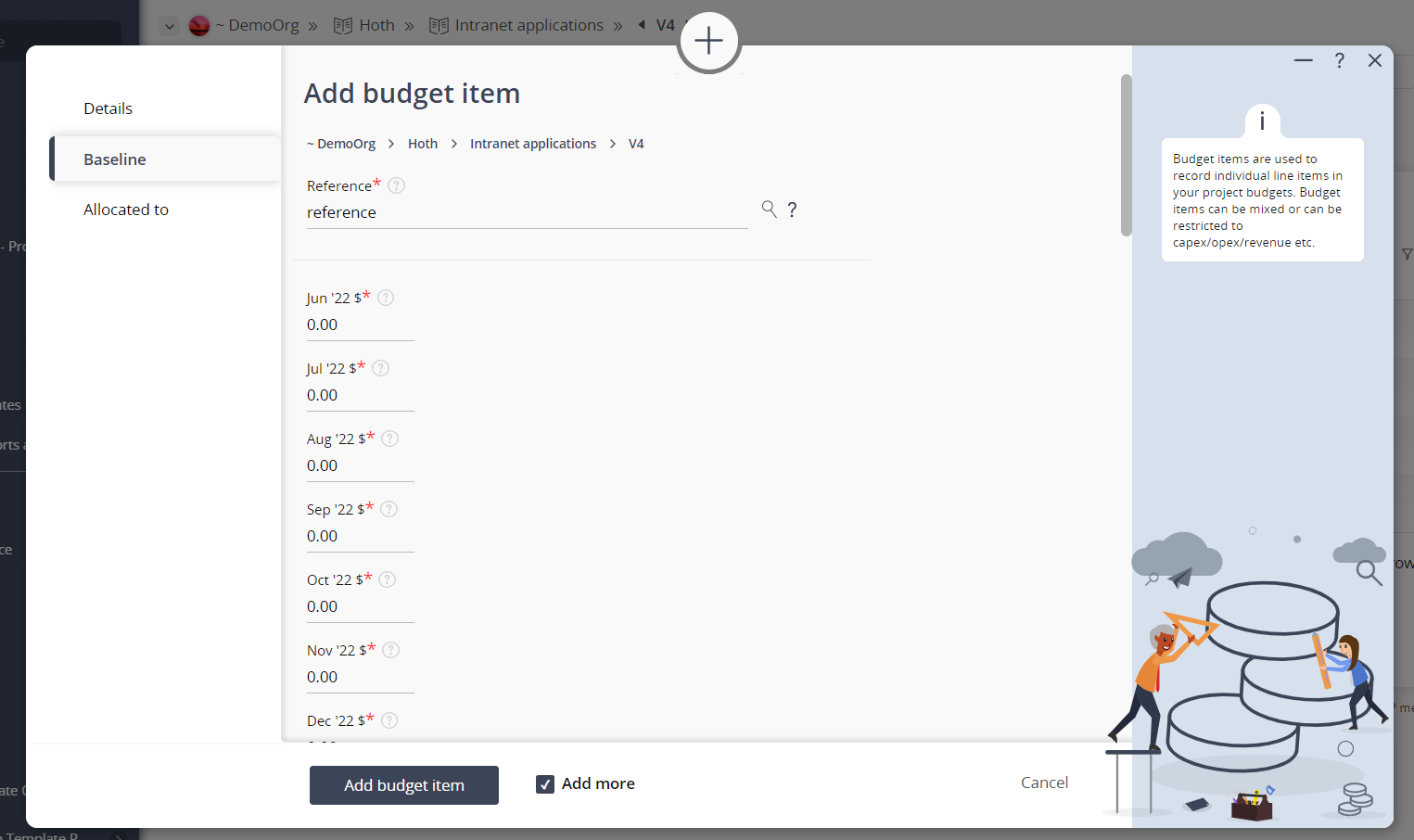This popup form can be accessed via the  add menu in the top header area of the
add menu in the top header area of the  budget view page, as shown in Figure 1. Alternatively you can access the
budget view page, as shown in Figure 1. Alternatively you can access the  add popup form from the bottom of the Budget items tab at this same view page, as shown in Figure 2.
add popup form from the bottom of the Budget items tab at this same view page, as shown in Figure 2.
 budget item for the selected budget or sub-group.
budget item for the selected budget or sub-group.
NOTE: If you accidentally try to add a new budget item with the same reference as an existing budget item for your budget group then you will get a warning message.
You will not be able to add a budget item until the Reference field has been filled in.
 Details
Details

 users or
users or  roles this budget item is allocated to by clicking on the tab indicated in Figure 6 above.
Use the Allocated to users multi-select box to select the user(s) you want to allocate this budget item to.
Use the Allocated to roles multi-select box to select the role(s) you want to allocate this budget item to.
You may select multiple users or roles by holding the CTRL or SHIFT keys and clicking on the name of the additional user(s) or roles(s). To de-select, click on the highlighted name while still holding the CTRL or SHIFT keys so as not to lose all other selected users or roles.
The selected users or members of the selected roles will be able to log
roles this budget item is allocated to by clicking on the tab indicated in Figure 6 above.
Use the Allocated to users multi-select box to select the user(s) you want to allocate this budget item to.
Use the Allocated to roles multi-select box to select the role(s) you want to allocate this budget item to.
You may select multiple users or roles by holding the CTRL or SHIFT keys and clicking on the name of the additional user(s) or roles(s). To de-select, click on the highlighted name while still holding the CTRL or SHIFT keys so as not to lose all other selected users or roles.
The selected users or members of the selected roles will be able to log  expense items on their
expense items on their  timesheets against this budget item.
Once you are happy with your entries click the “Add budget item” button at the bottom of the form. This will add a new budget item with the details that you supplied.
The new budget item can be viewed in the Budgets tab at the parent asset or budget group’s view pages, as shown in Figure 7.
timesheets against this budget item.
Once you are happy with your entries click the “Add budget item” button at the bottom of the form. This will add a new budget item with the details that you supplied.
The new budget item can be viewed in the Budgets tab at the parent asset or budget group’s view pages, as shown in Figure 7.

Fig 2 – Access via budgets tab
This popup is shown in Figure 3 and is used to add a newFigure 3 – Add budget item form
In Figure 3 above, the form has been broken down into three sections:
| Section 1 | This section contains a selection of important top fields: Budget group: This read-only field shows which budget group you are adding this new budget item to. Reference*: This is a mandatory field where a unique reference for this budget item must be entered. Add more: Set this check box if you’d like to keep the form open and add more budget items to this budget group after the current one has been created. |
|---|---|
| Section 2 | These are the tabs that you can cycle through to edit each section of the budget item.When you navigate to a new tabbed view in this popup, any information entered in Section 3 from the previous tabbed view will be saved. This means you do not need to click on any buttons to save each tab, but can instead click on the Add button at the bottom of the popup when you wish to add your new budget item with the set details. |
| Section 3 | This information will change as you cycle through the tabs shown in Section 2, and the available fields will change accordingly. A breakdown of the field information for each tab is provided below. |
Tab breakdown
The following information provides a breakdown of each of the tabbed views that may be available for you to set the budget item’s details under each section.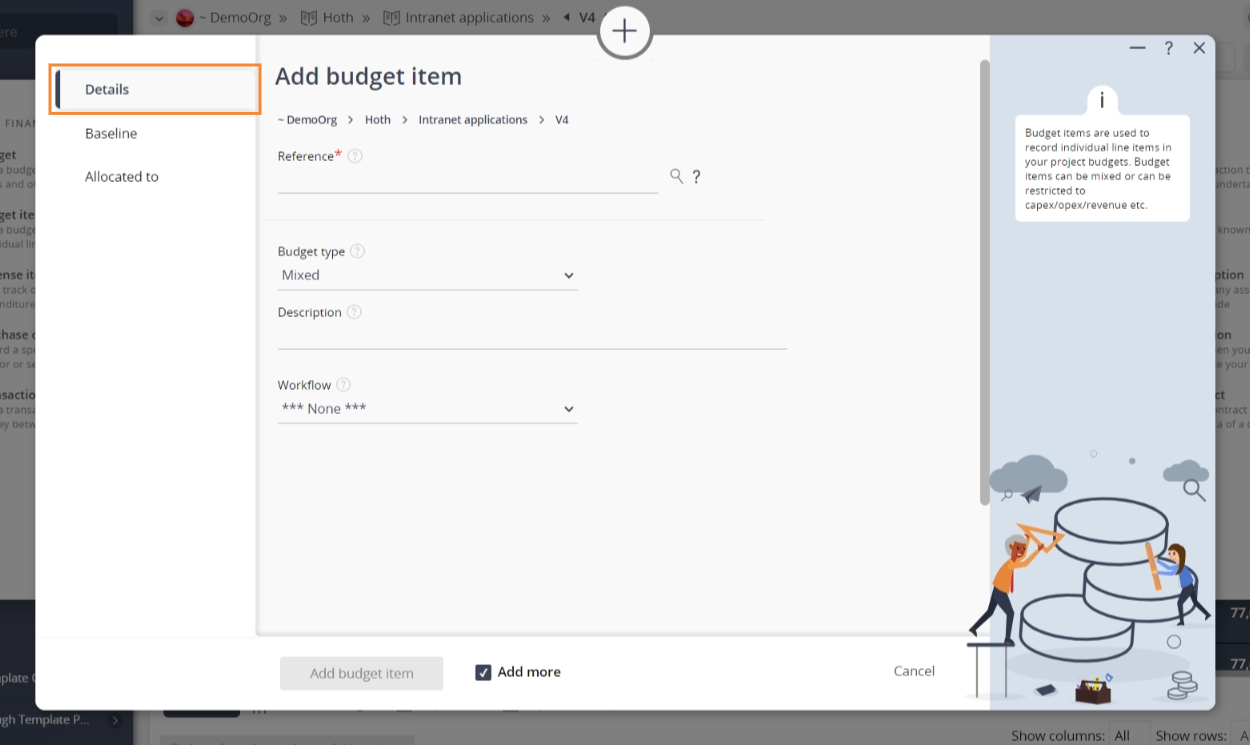
Figure 4 – Add budget item details tab
The details for the budget item can be assigned by clicking on the tab indicated in Figure 4 above. Here you can add a description for this budget item. Baseline
Baseline
Figure 5 – Add budget item baseline tab
The baseline for the benefit can be assigned by clicking on the tab indicated in Figure 5 above. Here you can enter values for the baselines for this budget item, broken down into monthly costs. Allocated to
Allocated to
Figure 6 – Add budget item allocation tab
You can assign which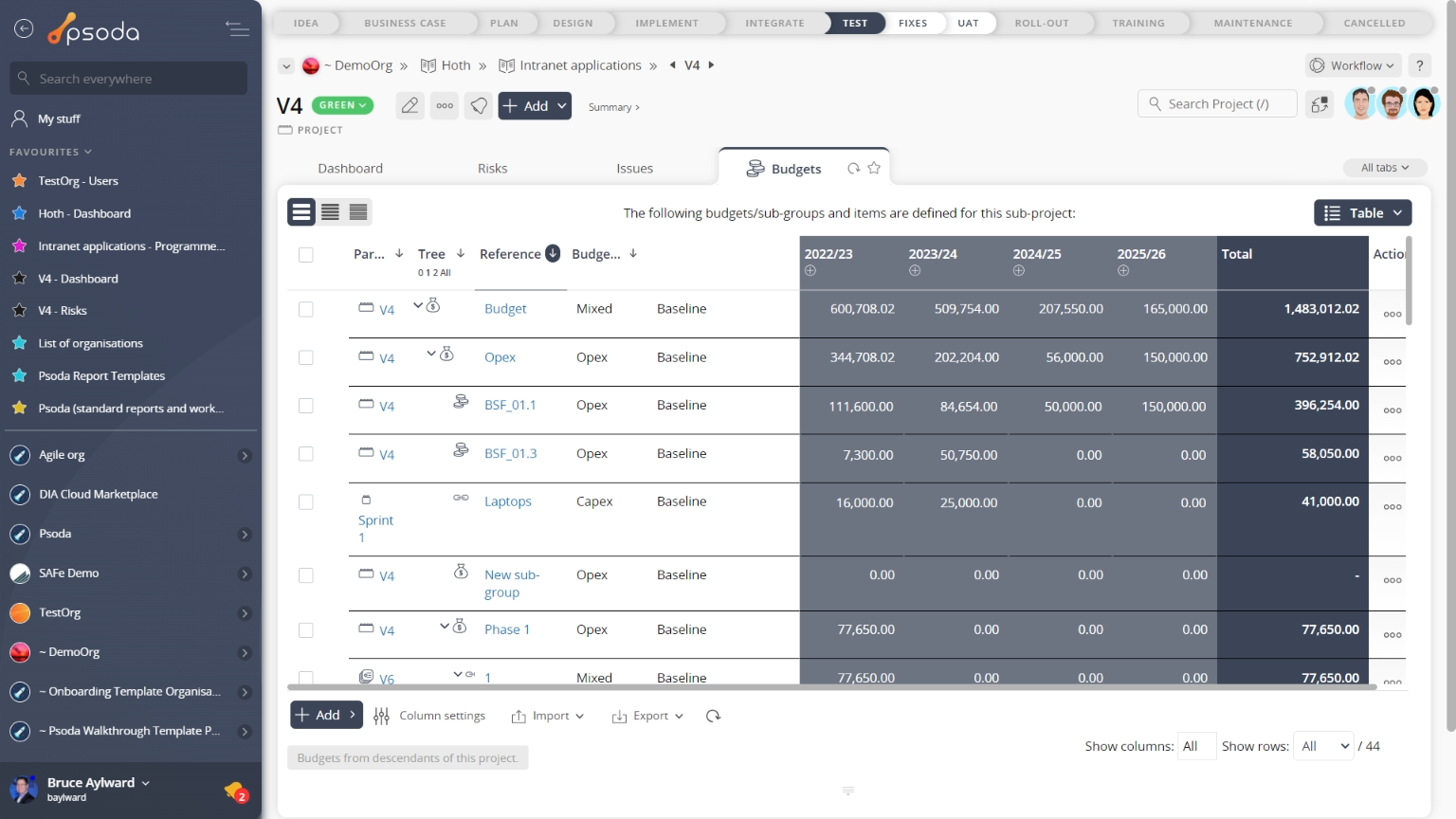
Figure 7 – View from budgets tab
Click the “Cancel” button if you no longer want to add a new budget item.
